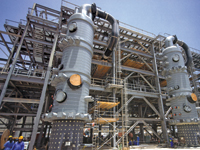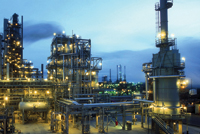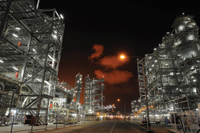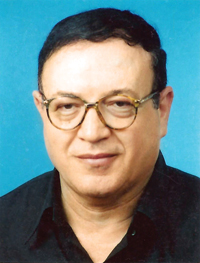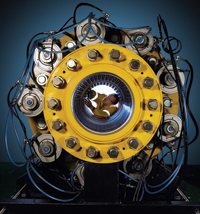
QATAR Petroleum International, part of state-owned Qatar Petroleum, has shelved a proposal to invest in Russia’s Yamal LNG project but has not ruled it out completely as it explores investment opportunities overseas, QPI’s director for upstream of operations, Ahmed Al Ahmed, says.
QPI, which has been tasked by the oil ministry to expand the emirate’s energy portfolio abroad, was looking at potential projects “on a case by case basis” and has ruled out none, including the possibility of entering into shale oil and gas projects in Qatar and abroad.
“Yamal LNG has been shelved but not killed,” he says when asked whether QPI was considering joining the LNG project in Russia’s Arctic, the cost of which is estimated at over $20 billion.
The project, in which Russian independent Novatek has an 80 per cent stake with Total holding 20 per cent, includes construction of LNG trains with a capacity of around 5 million-5.5 million tonnes per year (mtpy) each.
The first train is to be commissioned in late 2016, while the second and the third trains are scheduled to come on line in 2017 and 2018.
The joint venture had been looking at a potential third partner for the project and QPI has been considering the proposal for several years but has yet to come to a decision amid what some industry sources say are issues regarding the potential export of LNG from Yamal.
At present, Russian law does not allow independent gas producers to export LNG directly and state-owned gas giant Gazprom has the exclusive right to export gas, including LNG.
Moscow had been due to decide on whether to allow LNG exports by independent producers by the end of February but no decision has been announced.
The consortium of banks that is organising funding for Yamal LNG has reportedly says it would seek funding for only $5 billion unless Russia liberalises exports.
QPI has been courted by the Yamal LNG consortium partly because of its access to the financial resources of Qatar , the leading LNG exporter globally and the third wealthiest nation in the world. Its large LNG tanker fleet would also bring significant benefit to a greenfield project.
Qatari officials have said previously that they do not see the benefit of entering into high cost LNG projects at a time when the industry is faced with the prospect of a surge in US shale gas production.
The rise in US domestic gas output has led to a wide divergence between US Henry Hub prices, which are close to historic lows, and higher priced, oil-linked LNG sales into Asia.
Qatar, which has the world’s third largest conventional gas reserves after Russia and Iran, has imposed an indefinite moratorium on further development of its offshore North Field, the world’s largest concentration of non-associated gas, as it monitors reservoir behaviour.
QPI CEO Nasser Al Jaidah said late last year that Qatar did not plan to lift the moratorium and would need to venture overseas if it wanted to go beyond current LNG capacity of 77 mtpy, achieved at the end of 2010.
Qatar is looking first at joint investment abroad in conventional and unconventional gas projects with some of its existing foreign joint venture partners – ExxonMobil, Shell and Total – all of which have stakes in Qatari LNG projects and shale gas interests in the US and Canada.
“We are looking at opportunities in oil and gas and shale is in our strategy and shale oil as well,” Ahmed says in a panel discussion alongside representatives from ExxonMobil, Shell and Siemens Oil and Gas. He also did not rule out new partnerships with smaller, independent companies that he says were pioneers in the shale gas industry in the US.
Jaidah says the company’s objective is to have a 50/50 balance in upstream and downstream projects, adding that any new partner would have to have both technological and financial clout to open up new markets for Qatar.
QPI’s only upstream asset to date has been a 20 per cent stake in two exploration blocks in Mauritania acquired in 2008 in partnership with Total.
A year later, QPI entered into an agreement with Shell Petrochemicals Singapore, its first downstream acquisition in a joint venture with interests in an olefins plant integrated with another polymer plant in Singapore, a strategic investment that QPI has says will give it access to the Asian markets.
QPI is also in the process of taking over QP’s stakes in LNG receiving terminals in Europe – South Hook in the UK and Adriatic in Italy as well as the Golden Pass terminal in the US.
Other projects in the pipeline include the $4.5 billion Long Son Petrochemicals project in Vietnam, for which Qatar is likely to provide feedstock; a potential 24.5 per cent stake in a multi-billion dollar petrochemical and refinery complex in China, currently in the evaluation and pre-feasibility stage.
Meanwhile, Yamal LNG has let a contract for engineering, procurement, supply, construction, and commissioning on its planned 16.5-million tonne/year natural gas liquefaction plant to a consortium of France’s Technip and Japan’s JGC.







































































